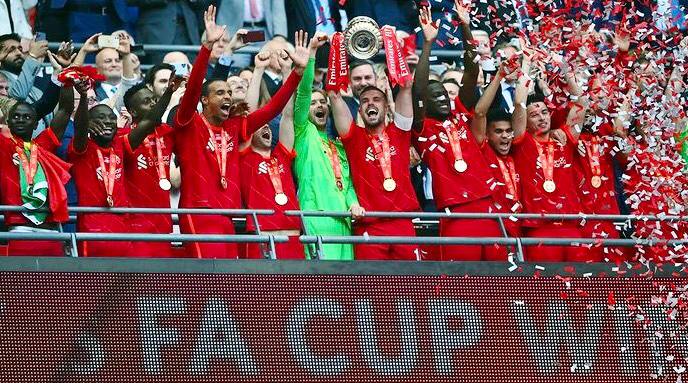
Liverpool bagged its second trophy of the season and they could yet collect a further two before the end of May.
Morning, Reds 😁🏆 pic.twitter.com/rJ3ICHLLo1
— Liverpool FC (@LFC) May 15, 2022
There was a significant element of déjà vu on Saturday as Liverpool beat Chelsea on penalties at Wembley to win the FA Cup, three months after the Reds conquered the Blues in the same fashion and at the same venue. In February, Liverpool and Chelsea contested the League Cup final which ended 0-0 after regular time as well as after extra-time, and Jürgen Klopp’s men emerged 11-10 winners in the shootout after Chelsea’s substitute goalkeeper Kepa Arrizabalaga skied his effort over the bar.
76 days later the two sides met once again to battle it out for the other, superior, major domestic cup in English football. Almost 85,000 spectators filled Wembley Stadium as the red half of Merseyside met the blue side of London for the chance to be crowned champions of the oldest cup competition in world football.
Liverpool were the more dominant faction in the opening stages before talisman Mohamed Salah was forced off with a groin injury after 30 minutes. Liverpool looked likelier to open the scoring albeit both teams registered just a single shot on target in the first half. Chelsea saw more of the ball in the second period but failed to create any goal-scoring opportunities. Liverpool connected with the woodwork twice in the final minutes of regular time and the tie ended goalless after 90 minutes, and the deadlock remained intact after an additional 30 minutes.
Marcos Alonso and James Milner netted their respective teams’ first penalties before Chelsea captain Cesar Azpilicueta struck the post from 12 yards. Similarly to the shootout in the League Cup final, the spot-kicks were of a very high standard and all of the next six penalties found the back of the net. Sadio Mané had the chance to seal the Cup for Liverpool, but the Senegalese forward was denied by countryman Edouard Mendy in the Chelsea goal.
Hakim Ziyech and Diogo Jota each converted to take the shootout score to 5-5 before Mason Mount saw his attempt kept out by Alisson Bekker, leaving Konstantinos Tsimikas to score the winning penalty and seal Liverpool’s first FA Cup title since 2006. An extremely rare occurrence in that the two domestic cup finals were contested by the same two teams and that the final result was almost identical.
WE ARE THE #EmiratesFACup WINNERS!!!!!!! pic.twitter.com/eZMe5IRbB2
— Liverpool FC (@LFC) May 14, 2022
In six full seasons as Liverpool manager, Klopp has delivered six major honours (may yet rise to seven or eight) and he has gotten his hands on almost every piece of silverware available to him as Reds boss. The 54-year-old German coach made a prolific statement by winning the UEFA Champions League as his first trophy after signing at Anfield four years prior, and he went on to capture the Premier League, FIFA Club World Cup and UEFA Super Cup the following season.
Moreover, Jordan Henderson has become the first Liverpool captain to lift six different trophies with the club. Trent Alexander-Arnold, meanwhile, has tasted success in every club competition he has played (bar the Europa League) and the dead-ball specialist has collected six winner’s medals all before his 24th birthday.
We delve into some of the numbers behind Liverpool’s FA Cup triumph…
150 – Editions of the FA Cup to date.
50 – Major trophies won by Liverpool Football Club following their recent FA Cup success.
21 – Years since Liverpool last won the FA Cup and the League Cup in the same season.
16 – Years since Liverpool had last won the FA Cup.
11 – Trophies won by Jürgen Klopp during his managerial career.
8 – FA Cup titles won by Liverpool, behind only Arsenal (14) and Manchester United (12).
6 – Cup finals at Wembley in which Mason Mount has been on the losing side.
4 – Clubs to have won both English domestic cups in the same season (Arsenal 1992/93; Chelsea 2006/07; Liverpool 2000/01, 2021/22; Manchester City 2018/19).
3 – Chelsea are the losing finalists in the FA Cup for a third consecutive year.
3 – Amount of times the FA Cup has been decided on penalties.



